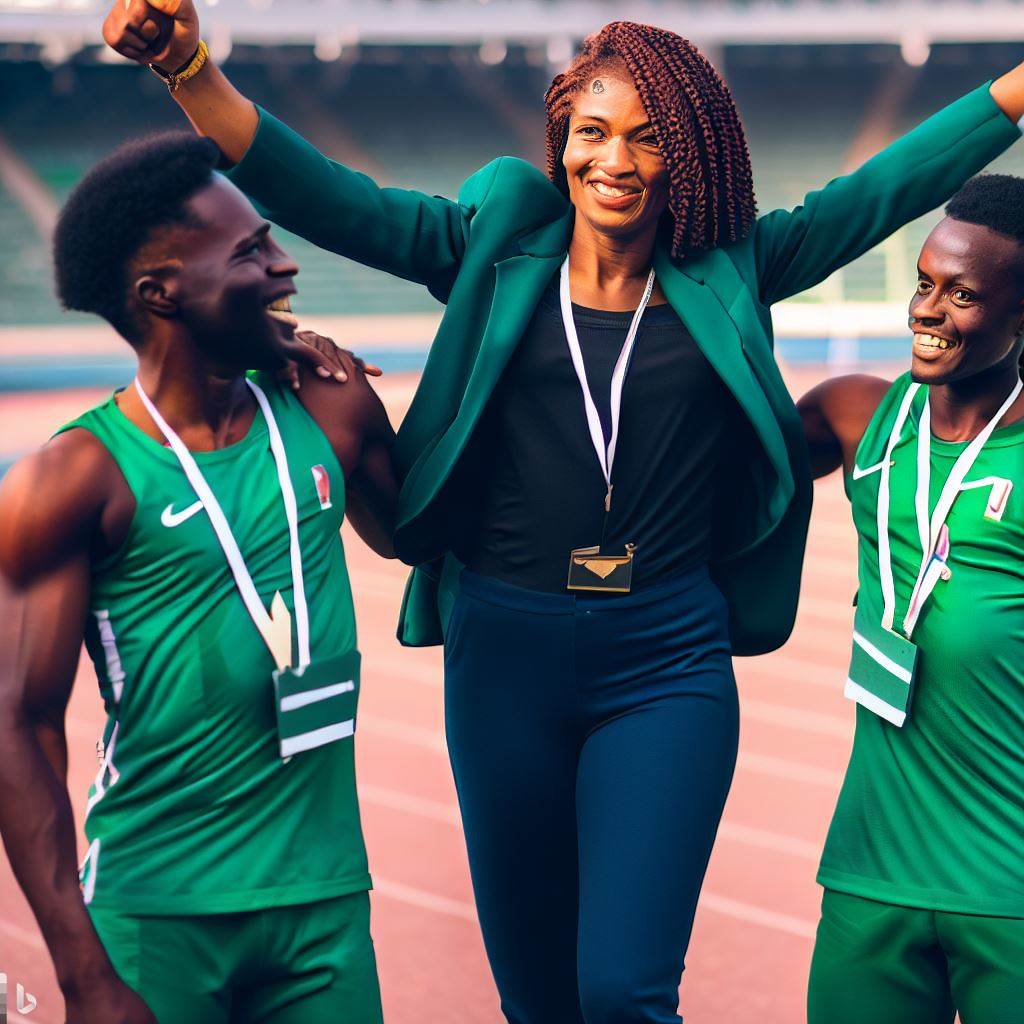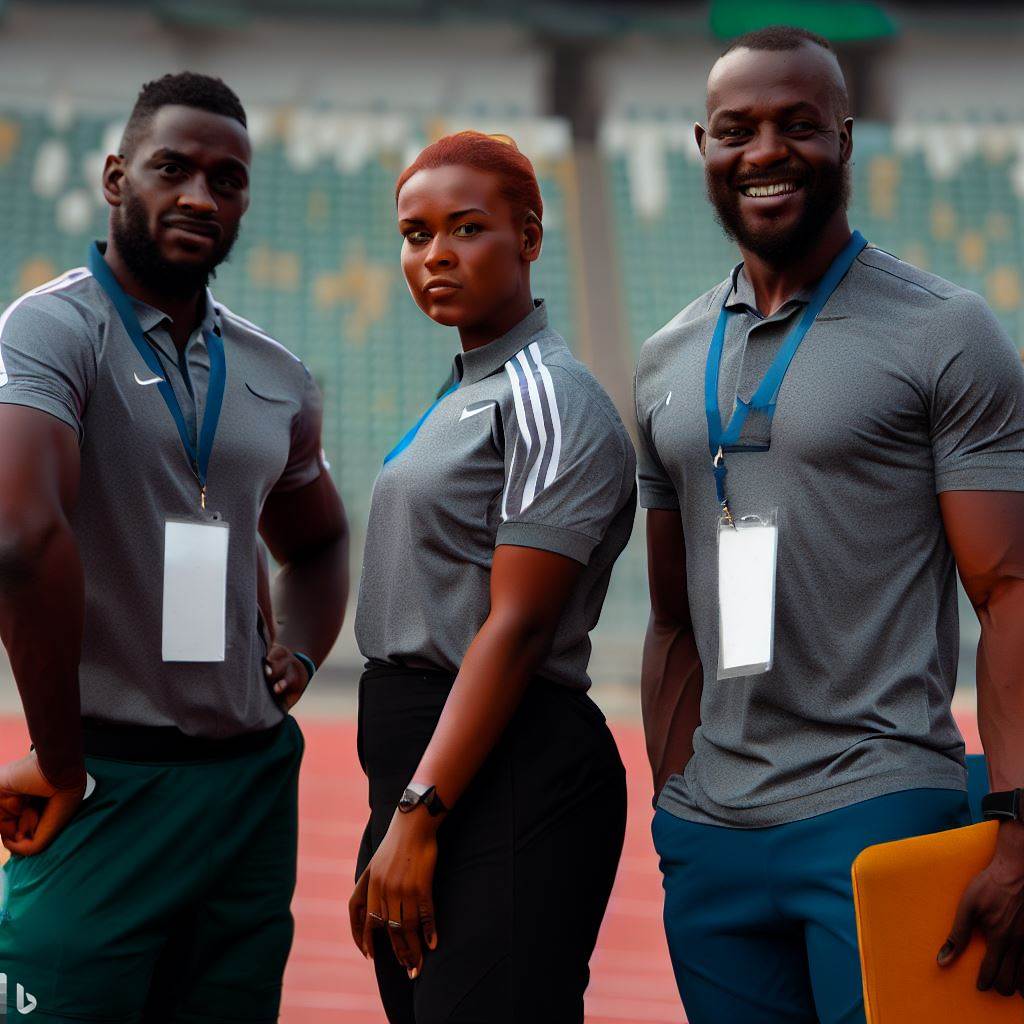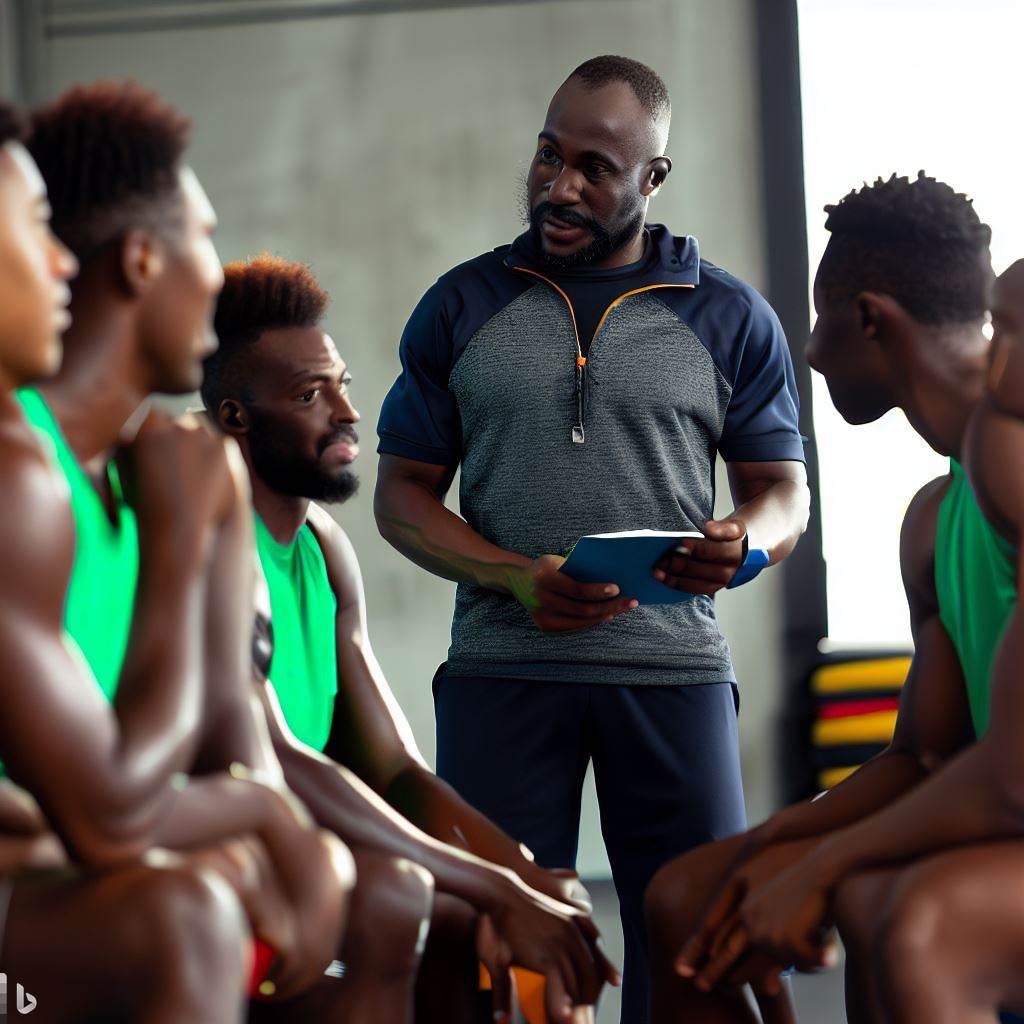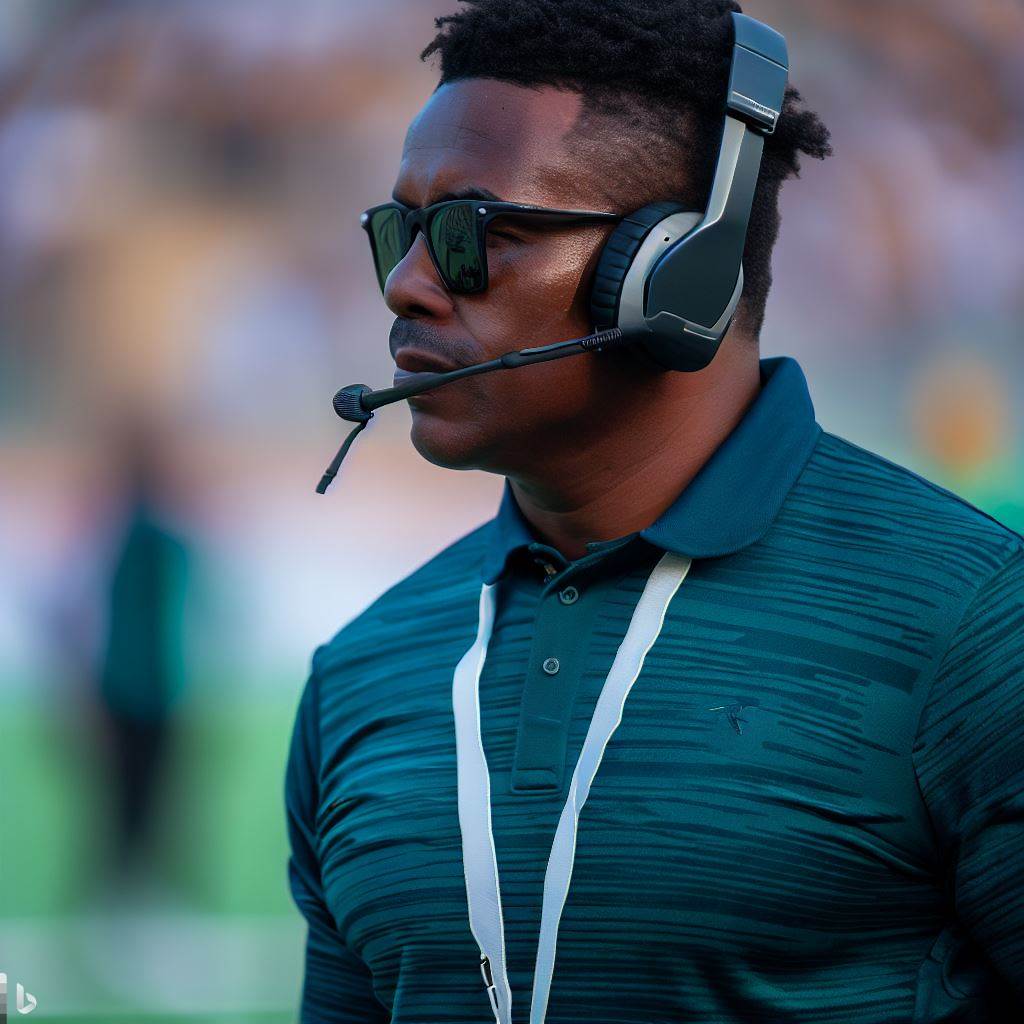Introduction
A. Overview of Nigeria’s sports scene and its significance
Nigeria’s sports scene holds great importance in the country as it plays a vital role in promoting unity, national pride, and talent development and athletic directors plays the most important roles in Nigeria sports.
With a rich sporting heritage and passionate fan base, Nigeria has excelled in various disciplines such as football, basketball, and athletics on the international stage.
B. Roles of Athletic Directors in Nigeria’s sports scene
Athletic Directors roles in Nigeria’s sports scene are crucial decision-makers responsible for overseeing the organization, development, and management of athletic programs.
They play a pivotal role in shaping the future of sports in the country by ensuring efficient operation, providing leadership, and promoting excellence.
Their responsibilities range from strategic planning, budget management, and facility maintenance to talent identification, coach recruitment, and athlete welfare.
Athletic Directors function as mediators between athletes, coaches, administrators, and stakeholders, fostering collaboration and fostering a conducive environment for growth.
They facilitate partnerships with corporate sponsors, government agencies, and international bodies to secure funding, promote grassroots sports, and provide opportunities for athletes to compete at elite levels.
Moreover, Athletic Directors are key figures in implementing sports policies and regulations, ensuring adherence to ethical standards, fair play, and anti-doping measures.
Athletic directors play important roles in talent identification and development in Nigeria sports, scouting for promising athletes at a young age and providing them with the necessary resources and training to excel.
Overall, the roles of Athletic Directors in Nigeria’s sports scene are indispensable in shaping the country’s sporting landscape by maximizing potential, promoting inclusivity, and nurturing the aspirations of athletes at every level.
Definition and Qualifications
A. Athletic Director’s role
Athletic Directors in Nigeria play a crucial roles in managing sports programs.
B. Education and experience required for becoming an Athletic Director in Nigeria
- A bachelor’s degree in sports management, physical education, or a related field is typically required.
- Experience in coaching or participating in sports at a high level is highly beneficial.
- An understanding of sports administration and financial management is essential for success.
- Leadership skills, including the ability to motivate and inspire athletes, are important qualities.
- Communication and interpersonal skills are necessary for building relationships with stakeholders.
- Knowledge of rules and regulations governing sports in Nigeria is crucial for compliance.
- An Athletic Director should have strong organizational abilities to manage schedules and events.
- Problem-solving skills are necessary to address challenges and ensure smooth sports operations.
- Networking skills are valuable for establishing partnerships and securing sponsorships for sports programs.
- An Athletic Director should possess a strong passion for sports and a commitment to athlete development.
- Continuous professional development and staying updated on industry trends are advisable.
- Adapting to the Nigerian sports culture and understanding local traditions can enhance effectiveness.
- An Athletic Director should prioritize the holistic growth and well-being of student-athletes.
- Maintaining integrity, ethical standards, and promoting fair play are fundamental principles.
- Lastly, successful Athletic Directors in Nigeria should possess qualities of resilience and determination.
By meeting the necessary qualifications, an individual can become an Athletic Director and contribute positively to Nigeria’s sports scene.
Read: Qualities of Successful Assistant Coaches in Nigeria
Administrative Responsibilities
Athletic directors in Nigeria play a crucial roles in the sports scene, not only in terms of coaching and managing teams, but also in various administrative responsibilities.
These responsibilities are essential to ensure the smooth functioning of sports programs and compliance with rules and regulations.
A. Planning and budgeting for sports programs
Athletic directors have the roles of developing comprehensive plans and budgets for Nigeria sports programs in Nigeria.
This includes setting goals, determining program priorities, and allocating resources effectively to achieve desired outcomes.
They must carefully analyze the needs of different sports teams, considering factors such as equipment, coaching staff, travel expenses, and facility maintenance.
Basically, by planning and budgeting strategically, athletic directors can enhance the overall performance of sports programs.
B. Hiring and supervising coaching staff
Another crucial responsibility of athletic directors is the roles of recruiting and supervising Nigeria coaching sports staff.
They must actively search for qualified coaches who can bring the necessary expertise and experience to develop athletes.
Athletic directors also need to carefully evaluate coaching candidates, considering their qualifications, coaching philosophy, and ability to work well with athletes.
Once coaches are hired, they must also provide ongoing supervision and support to ensure the development of a successful coaching team.
C. Overseeing facility and equipment management
Athletic directors roles also include managing Nigeria sports facilities and equipment efficiently.
They must ensure that facilities are in good condition and safe for athletes to use.
This includes regular maintenance, repairs, and upgrades of sporting facilities to meet the standards set by governing bodies.
Additionally, athletic directors need to oversee equipment inventory, purchase new equipment when necessary, and ensure its proper maintenance for optimal performance.
D. Ensuring compliance with rules and regulations
Compliance with rules and regulations is a crucial aspect of sports programs, and athletic directors in Nigeria are responsible for ensuring that their programs adhere to all relevant guidelines and regulations.
They need to stay updated on the rules governing various sports and monitor the program’s activities to ensure compliance.
This includes managing athlete eligibility, drug testing, academic requirements, and fair play policies.
Athletic directors must also collaborate with school authorities and sports governing bodies to address any concerns regarding compliance and implement effective solutions.
In essence, athletic directors in Nigeria’s sports scene have important administrative responsibilities that contribute to the success and growth of sports programs.
From planning and budgeting to hiring coaching staff, overseeing facilities, and ensuring compliance, their role is multifaceted and crucial for overall program development.
Read: Technology’s Role in Assistant Coaching in Nigeria
Financial Management
A. Securing sponsorships and funding for sports programs
- Athletic directors play a crucial roles in the financial aspect of sports programs in Nigeria.
- They actively seek sponsorships and funding from various sources to support these programs.
- By establishing connections with corporate entities and organizations, they secure financial assistance.
- These funds help cover expenses such as equipment purchases, training camps, and tournament participation.
- Athletic directors utilize their networking skills to build relationships with potential sponsors and donors.
- They negotiate partnership deals, ensuring mutual benefits for both the sports programs and the sponsors.
- Through effective communication and persuasive abilities, they convince sponsors to invest in Nigerian sports.
- Securing sponsorships and funding not only strengthens sports programs but also enhances the overall development of athletes.
- The financial support allows athletes to access better training facilities and expert coaches.
- It also enables them to participate in international tournaments, gaining exposure and experience.
B. Allocating budget resources efficiently
- Athletic directors also plays roles of managing the finances allocated to Nigeria sports programs.
- They strategically allocate budget resources, ensuring optimum utilization for various needs.
- They consider priorities such as equipment upgrades, facility maintenance, and athlete development.
- As well as analyzing the needs of the programs, they make informed decisions on budget distribution.
- Athletic directors ensure that the budget is allocated fairly across different sports teams and programs.
- They evaluate the potential impact of each expenditure, maximizing the benefits for athletes and teams.
- Efficient allocation of budget resources helps in creating a sustainable and successful sports scene in Nigeria.
- Athletic directors constantly review and adjust the budget, adapting to changing circumstances.
- They remain open to feedback from coaches, athletes, and stakeholders regarding budgetary needs.
- By efficiently managing financial resources, athletic directors contribute to the growth and success of sports programs.
C. Managing finances for equipment, staff salaries, and facility maintenance
- Athletic directors handle the intricate financial management of equipment, staff salaries, and facility maintenance.
- They ensure that necessary equipment is procured within budget constraints, meeting the needs of athletes
- By maintaining a proper inventory system, they track equipment usage, repairs, and replacements.
- They negotiate with suppliers to strike favorable deals, obtaining the best equipment at reasonable prices.
- Athletic directors oversee staff salaries, ensuring fair compensation for coaches, trainers, and support personnel.
- They manage payroll, taking into account performance-based incentives and contractual obligations.
- Facility maintenance is another vital aspect managed by athletic directors, ensuring safe and functional venues.
- They allocate funds for regular maintenance, repairs, and upgrades to enhance the sports environment.
- Athletic directors implement financial controls and accountability measures to prevent misuse of funds.
- Lastly, they maintain transparent financial records, facilitating audits and ensuring compliance with regulations.
Read: Assistant Athletic Trainer Jobs: Opportunities in Nigeria

Program Development and Promotion
Athletic directors in Nigeria play a vital role in the development and promotion of sports programs.
They are responsible for creating and implementing athletic programs and schedules to ensure the smooth functioning of sporting activities in the country.
A. Developing Athletic Programs and Schedules
Athletic directors are at the forefront of developing comprehensive athletic programs that cater to the needs and interests of a diverse range of athletes.
They strategize and plan various sports activities, ensuring there is a balanced mix of competitive and recreational programs.
These directors work closely with coaches, administrators, and other staff members to design schedules that accommodate training sessions and competitions for all sports throughout the year.
Building a well-rounded program requires careful coordination and consideration of factors such as facilities availability, team requirements, and student-athlete welfare.
B. Encouraging Participation and Recruitment of Talented Athletes
Athletic directors are passionate about creating an inclusive sports culture and encouraging maximum participation from talented athletes.
They actively identify and recruit promising young athletes from schools and local communities to represent Nigeria at various levels.
Through school visits, talent scouting programs, and partnerships with grassroots sports organizations, athletic directors aim to identify potential stars and nurture their talent to achieve national and international success.
They provide support, resources, and mentoring to athletes, ensuring they have the opportunity to reach their full potential.
C. Promoting Sports Events and Fostering Community Engagement
One of the key responsibilities of athletic directors is to promote sports events and foster community engagement.
They understand the importance of creating a vibrant sports scene that captivates the public and brings communities together.
Athletic directors actively engage with sponsors, media outlets, and local authorities to raise awareness and generate interest in sporting events.
They organize press conferences, publicize competitions, and leverage social media platforms to reach a wider audience.
By involving local communities, they create a sense of ownership and pride, which ultimately leads to increased participation and support for sports.
Moreover, athletic directors organize community outreach programs, sports clinics, and grassroots initiatives to ensure sports are accessible to all members of society.
By nurturing a strong relationship between sports organizations, athletes, and the community, these directors contribute to the overall development of sports in Nigeria.
In summary, the roles of athletic directors in program development and promotion are vital for the growth and success of sports in Nigeria.
Through developing comprehensive athletic programs, encouraging the participation of talented athletes, and promoting sports events, these directors contribute to the overall well-being of sports in the country.
Their dedication and strategic efforts pave the way for Nigeria to achieve greater heights in the world of sports.
Read: Breaking into Sports Broadcasting: A Guide for Nigerians
Student-Athlete Support and Welfare
A. Ensuring academic progress and eligibility requirements
Athletic directors in Nigeria play a crucial role in ensuring academic progress and eligibility requirements of student-athletes.
They closely monitor their academic performance to ensure they meet the required standards.
Athletic directors work with coaches and teachers to develop strategies for student-athletes who may be struggling academically.
They provide necessary resources and tutoring services to help student-athletes improve their academic performance.
Athletic directors understand the importance of balancing academics and athletics in the lives of student-athletes.
They ensure that student-athletes are able to meet their academic responsibilities while participating in sports.
Athletic directors establish partnerships with educational institutions to provide scholarships and financial assistance for student-athletes.
They advocate for the importance of education and encourage student-athletes to prioritize their studies.
B. Providing counseling and support services for student-athletes
Athletic directors also provide counseling and support services for student-athletes.
They recognize the unique challenges and pressures faced by student-athletes and offer guidance and mentorship.
Athletic directors create a safe and confidential space for student-athletes to discuss their concerns and seek help.
They connect student-athletes with appropriate professionals in the field of mental health when necessary.
C. Fostering a positive and inclusive team environment
Fostering a positive and inclusive team environment is another key responsibility of athletic directors.
They promote teamwork, sportsmanship, and respect among student-athletes.
Athletic directors encourage a culture of inclusivity and discourage discrimination and bullying.
They organize team-building activities and workshops to strengthen team bonds and promote unity.
Athletic directors ensure that every student-athlete feels valued and supported within the team.
They address any conflicts or issues that may arise and strive to maintain a harmonious team environment.
Overall, the roles of athletic directors in Nigeria’s sports scene encompass academic support, counseling, and fostering a positive team environment.
They prioritize the welfare and well-being of student-athletes, understanding that their success goes beyond the field.
Through their dedication and efforts, athletic directors contribute to the holistic growth and development of student-athletes in Nigeria.
Compliance with Governing Bodies
A. Adhering to the guidelines of national and international sports organizations
- Athletic directors in Nigeria play a crucial role in ensuring compliance with the guidelines set by both national and international sports organizations.
- They stay updated with the latest rules and regulations, constantly monitoring any changes imposed by governing bodies.
- By adhering to these guidelines, athletic directors promote fair play and maintain the integrity of Nigerian sports.
- They work closely with coaches, athletes, and administrative staff to ensure everyone understands and follows the established rules.
- Meeting the requirements set by national and international organizations is essential to avoid penalties or disqualifications.
B. Ensuring athlete eligibility according to regulations
- Athletic directors take responsibility for verifying athlete eligibility in accordance with the regulations set by governing bodies.
- They verify factors such as age, academic standing, and any other requirements specified by the sports organizations.
- By enforcing athlete eligibility, athletic directors ensure fair competition and prevent the participation of ineligible individuals.
- They coordinate with relevant institutions, such as schools or universities, to gather all necessary information and documentation.
- Maintaining accurate records and documentation is crucial to ensure transparency and avoid any potential scandals or controversies.
C. Addressing any issues or violations promptly and appropriately
- Athletic directors are responsible for promptly addressing any issues or violations that may arise within Nigeria’s sports scene.
- They act as mediators and decision-makers in resolving conflicts or disputes related to compliance and regulations.
- When violations occur, athletic directors take appropriate disciplinary actions while following due process and fair procedures.
- They collaborate with relevant stakeholders to investigate and gather evidence to support their decisions.
- By addressing issues and violations promptly and appropriately, athletic directors maintain the integrity and reputation of Nigerian sports.
Essentially, compliance with governing bodies is a critical aspect of an athletic director’s role in Nigeria’s sports scene.
Adhering to the guidelines of national and international sports organizations, ensuring athlete eligibility, and addressing any issues or violations promptly and appropriately are key responsibilities.
By fulfilling these responsibilities, athletic directors contribute to promoting fair play, upholding the integrity of Nigerian sports, and maintaining the trust of athletes and spectators.
Developing and Maintaining Stakeholder Relationships
A. Building partnerships with schools, universities, and sports organizations
- Athletic directors in Nigeria play a crucial role in developing strong partnerships with schools, universities, and sports organizations.
- They actively seek out opportunities to collaborate and form alliances that benefit all parties involved.
- By building these partnerships, athletic directors can ensure a steady flow of talent into their sports programs.
- They establish relationships with school administrations to secure resources and support for their teams.
- Athletic directors also engage with universities to create pathways for student-athletes to pursue higher education while continuing their sports careers.
- Collaborating with sports organizations allows athletic directors to stay updated on industry trends and best practices.
- These partnerships create a network of support and resources that contribute to the overall growth and success of sports in Nigeria.
B. Collaborating with coaches, athletes, and parents for effective communication
- Effective communication is crucial for the success of any sports program, and athletic directors in Nigeria understand this.
- They collaborate closely with coaches to ensure that strategies and goals are clearly communicated to the athletes.
- Athletic directors also work with coaches to address any issues or concerns raised by athletes or parents.
- They foster an open and transparent line of communication to create a supportive and positive team environment.
- Athletic directors actively involve parents in their children’s sports journey, seeking their input and feedback.
- They organize regular meetings and parent education sessions to keep parents informed and engaged in the athletic program.
- These collaborative efforts strengthen the bond between coaches, athletes, parents, and the athletic director, contributing to a cohesive and successful sports program.
C. Engaging with the community and media for positive exposure
- Athletic directors recognize the importance of engaging with the community and media to promote their sports programs.
- They actively seek opportunities to showcase their athletes’ achievements through local media outlets.
- Athletic directors also organize community events and fundraisers to foster a connection between the sports program and the community.
- They collaborate with local businesses and organizations to sponsor events and provide resources to support the athletes.
- Engaging with the media and community helps increase awareness and support for the sports program.
- Athletic directors leverage social media platforms to share updates, highlights, and success stories of their athletes.
- Through positive exposure, athletic directors enhance the reputation of their sports program and attract talented athletes and sponsors.
Overall, developing and maintaining stakeholder relationships is a vital aspect of the role of athletic directors in Nigeria’s sports scene.
By building partnerships with schools, universities, and sports organizations, collaborating effectively with coaches, athletes, and parents, and engaging with the community and media, athletic directors contribute to the growth and success of sports in Nigeria.
Delve into the Subject: Challenges Facing Strength Coaches in Nigeria
Challenges Faced by Athletic Directors in Nigeria
Being an Athletic Director in Nigeria comes with its fair share of challenges that hinder the development and growth of sports in the country.
These challenges are diverse in nature and require innovative solutions.
In this section, we will explore three major challenges faced by Athletic Directors in Nigeria:
A. Lack of Adequate Funding and Resources
- The primary obstacle faced by Athletic Directors is the lack of adequate funding for sports programs.
- Insufficient funds limit the ability to improve facilities, provide necessary equipment, and hire qualified coaches.
- Without proper funding, it becomes challenging to attract and retain talented athletes, hindering their growth and potential.
- Additionally, limited resources impact the planning and execution of competitions, training camps, and talent identification programs.
- Athletic Directors have to constantly seek creative methods to secure funding and make do with the available resources.
B. Balancing Academic and Athletic Priorities
- Athletic Directors face the delicate task of balancing the academic commitments of student-athletes.
- Education is highly valued in Nigerian society, and athletes are expected to perform well academically.
- Ensuring that athletes excel in both sports and academics requires proper time management and coordination.
- These directors must work closely with teachers, coaches, and parents to develop individualized plans for student-athletes.
- However, this balancing act can be challenging, and some athletes may struggle to cope with the demands of both areas.
C. Overcoming Cultural and Societal Obstacles
- Traditional cultural values often prioritize academic pursuits over sports, posing a significant challenge to Athletic Directors.
- In some communities, sports may not be regarded as a viable career path, making it difficult to garner support and interest.
- The deep-rooted societal belief that sports is secondary to academics creates a barrier to the development of athletes.
- Athletic Directors have to actively challenge these cultural norms and raise awareness about the benefits of sports.
- They must also address gender disparities and promote equal opportunities for boys and girls in sports.
In general, Athletic Directors in Nigeria face numerous challenges that hinder the growth and development of sports in the country.
These include the lack of adequate funding and resources, the need to balance academic and athletic priorities, and the cultural and societal obstacles that devalue sports.
Despite these challenges, Athletic Directors continue to play a vital role in shaping Nigeria’s sports scene and work tirelessly to overcome these obstacles for the betterment of sports in the country.
Discover More: Nigeria’s Athletics Professions: Potential and Pitfalls
Conclusion
A. Roles and Importance of Athletic Directors in Nigeria’s Sports Scene
- Athletic Directors (ADs) play pivotal roles in Nigeria’s sports development.
- They oversee program management, budgeting, and athlete recruitment.
- ADs promote sports excellence and talent identification.
- They foster community engagement and sports outreach.
- ADs ensure sports facilities’ maintenance and upgrades.
- They are catalysts for grassroots sports development.
B. Recognition of the Challenges and Rewards Associated with the Position
- ADs face budget constraints and resource limitations.
- Coping with administrative and bureaucratic hurdles can be challenging.
- However, the rewards include nurturing future sports stars.
- ADs contribute to national pride and sporting achievements.
- They create opportunities for athletes and scholarships.
- ADs inspire a love for sports in the youth.
C. Call to Action for Continued Support and Development of Nigeria’s Sports Programs
- We must invest in sports infrastructure and facilities.
- Government and private sectors should increase funding.
- Support grassroots sports initiatives and talent identification.
- Encourage community involvement in sports development.
- Foster partnerships with educational institutions.
- Together, we can propel Nigeria’s sports scene to greater heights!




